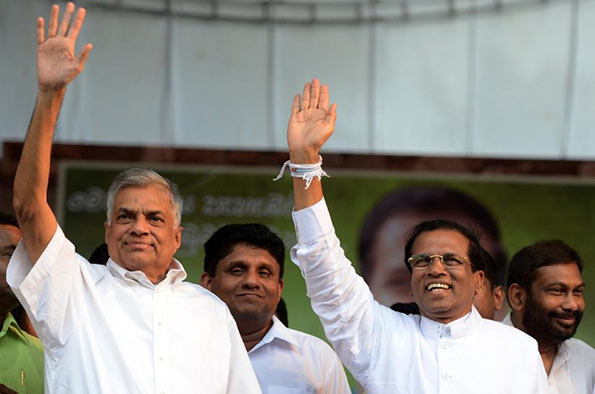Sri Lankan premier faces no-confidence motion

Sri Lanka’s opposition said Friday it has filed a motion of no confidence in the country’s new prime minister, a move likely to hasten the dissolution of parliament in the politically divided country.
Ranil Wickremesinghe took over this year at the helm of a new minority government that has depended on the opposition’s support to push through political reforms.
But he has also launched a series of investigations into alleged corruption by the country’s former rulers — now in opposition — and would be all but certain to lose a no-confidence vote in parliament.
The no-confidence motion already has the support of 112 of the 225 members in the house.
“We have listed several charges against the prime minister, including the use of the police against his political opponents,” opposition spokesman Manusha Nanayakkara told reporters.
Analysts say President Maithripala Sirisena may now be forced to dissolve parliament and call fresh general elections, which he promised when he was elected in January.
Sirisena appointed the then opposition leader Wickremesinghe as his prime minister soon after defeating former strongman president Mahinda Rajapakse, who had been in power from 2004.
Wickremesinghe’s United National Party had depended on opposition support to bring about constitutional reforms, but the two sides are poles apart when it comes to investigating past actions of Rajapakse’s regime.
Rajapakse’s younger brother, former Economic Development minister Basil, is already in custody in connection with misappropriating state funds, while several other immediate family members are also under investigation for corruption.
Parliament passed reforms in April to curb the powers of the president, including restoring a two-term limit — reversing changes made by Rajapakse during his rule.
But the ruling UNP was forced to compromise on other reforms to secure the support of the opposition, whose votes were crucial to gain a mandatory two-thirds majority in parliament.
(AFP)
Latest Headlines in Sri Lanka
- 2024 Grade 5 Scholarship Exam: Results Now Available January 23, 2025
- Anura Priyadarshana Yapa, wife, and two others granted bail January 23, 2025
- Sri Lanka raises meal prices for MPs in Parliament January 23, 2025
- CID arrests three in train ticket resale racket January 23, 2025
- Sri Lankan Government prioritizes accurate data systems to ensure food security January 23, 2025



what qualifications do the ministers that brought the no confidence have I think a no confidence should be brought on them as they are trying to stop the 20 amendment being passed they just want to create problems and cover up the thugs who are in parliament its a sad state of affairs, any ways this is what you get when you send people who are not fit to represent the masses in parliment just a bunch of time wasters and jokers who want to rob the poor mans money that he spends on a plate of dhal and bread
and who eats just one meal a day
Simple to say, most of who were signed against pm were under the fcid radar.
That’s it.
You are right about the qualifications! Recently I tried to access the profile of some of the the guys representing the people in parliament….there was nothing. The people have a right to know their profile sort of whos who apart from being a son of who. Things like their primary secondary and tertiary education work experience….and other experience that they have gone through before entering politics.
Whatever their qualifications once they enter parliament they have the right vote on any issue independent of party affliations and without which there would be a totalitarian dictatorship and we have had in the past.
Ranil represents a minority party and as it is he cannot get any legislation through by manipulating procedures and so far he had been lucky for lot of the guys in parliament have no idea of what is going on and by and by they are getting wiser and in the next 100 days he will have no working majority
I don’t agree to be educated is a must to lead the masses.
There’s been more honest leaders in the world without being in universities and educated to a higher level.
So the fact is not education.
It’s all about attitude, understanding society and their demands.
There might be PHd holders but they are not even knows how to handle a 10 person staff even.
If you can prove the courage and lead set of people you are indeed a drawing card.
I don’t suppose that anyone should not educate to be a minister.
They should be at least aware how to communicate record and understand world ethics.
We had many kings in the country, they didn’t have degrees, PHds etc, but they knew and learn how to lead.
Great example is Central Bank governor, he did a mistake, who will suffer?
Only the people in the country.
Great leaders should admit if they did a mistake. People will forgive.
Similarly, King Dutu Gemunu defeated King Elara, he had not educated in universities, but he defeated the Indian king and respect him by arranging a grate grave yard.
Dear concerned and Zama,
Did you ever care to check the qualifications of our revered first Prime Minister Rt. Hon. D.S.Senanayaka, another famous Prime Minister Rt. Hon. John Kotalawela and even that of our highly respected first Lady Prime Minister Madam Sirmavo Bandaranaika ? First two Prime Ministers rose up to become Privy Councillors and the lady PM had the distinction of leading the NAM Movement. None of them were reported to have possessed higher qualifications than grade seven. Another Prime Minister Mr. W Dahanayaka was only a teacher. Were THEY by any standards failures?
The question is not their qualifications. How honest and sincere are these politicans? The ex Central Bank and the present Central Bank bosses are also well qualified, just to remind you.